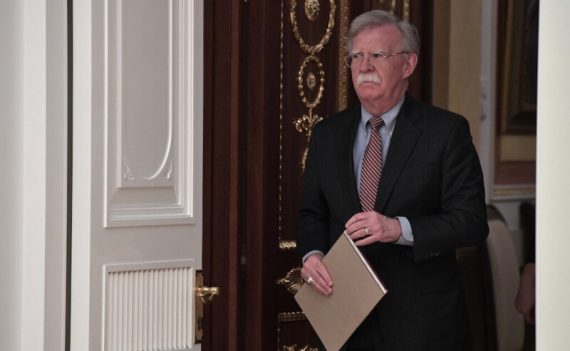The Washington Post grudgingly conceded the following fact in the title of an analysis by Bobby Ghosh: the world’s most important election in 2023 will be in Turkey. John Bolton’s recommendation to NATO in his January 16 essay for The Wall Street Journal and the oblique image gracing the cover of the special issue of The Economist on Turkey (Jan. 21-27) are also among the most striking manifestations of a partisan desire to meddle in Turkish elections spearheaded by the United States and the United Kingdom.
It goes without saying that the audience of the abovementioned publications is not limited to U.S. and Western decision-makers: the same content is being reproduced in Turkey with a nod of approval. The meaning of such messages, which hint at the Biden administration’s intent to meddle in Turkish elections (as signaled before Biden took office) and suggest that the psychological warfare which serves that purpose is about to escalate, can be analyzed within several frameworks.
Anti-Erdoğanism
Anti-Erdoğanism in the United States and other Western countries, together with the content that fuels that sentiment, is rooted in two historical phenomena that have been caricaturized to seamlessly resonate with the Western mind. The first (and more proximate) is dictatorship and, specifically, the various European dictatorships that emerged after World War I. The terms “dictator” and “dictatorship,” which originate in Latin, referred to a judge with extraordinary powers in the Roman Empire.
In the twentieth century, the terms came to refer to political systems where a single person or group exercise political power exclusively, and to their leaders. Carved into the crescent on the cover of The Economist, Erdoğan’s profile resembles the same magazine’s April 15-21, 2017 issue and Der Spiegel’s August 4, 2014 issue. Thus, The Economist reproduces the image of a dictator in the contemporary sense.
The second source of anti-Erdoğanism can be traced back to the black propaganda that targeted Sultan Abdulhamid II in the late nineteenth century. At the time and in later periods, Abdulhamid, among other things, was accused of being “despotic” and there was an attempt to portray his reign as an “age of tyranny.” As a side note, it is no coincidence that the Good Party’s chairwoman turned the idea into a campaign slogan at an impromptu gathering in Istanbul. Luckily, the message’s intended recipients could not sufficiently understand it and it was not repeated.
The comedian Sasha Baron Cohen’s The Dictator was presumably the first time the two concepts, “dictator” and “despotic sultan,” were married and presented to the greater public. The main character, who featured orientalist elements, rose to fame beyond the United States. Whereas the intended target of mockery was supposedly Muammar Gaddafi, the Libyan leader who was toppled in 2011, The Dictator helped caricaturize the leaders of other Muslim nations, against which the U.S. waged war in the name of “democracy.”
Erdoğan’s depiction on the cover of The Economist (June 8-14, 2013) and a cartoon, where the Turkish president is portrayed wearing a caftan and beheading Twitter with a sword, originally printed in the newspaper Sözcü to mock a 2014 ban on the social media platform and republished by Der Spiegel, were among the most striking examples of that tendency. Caricaturizing Erdoğan as a dictator or dictator-sultan serves two purposes: it feeds a distorted image of the Turkish president into Western minds, and persuades them to buy into the idea that the modern and secular republic, which emerged after the Ottoman Empire, is at risk, as suggested in the above articles.
Turkey’s Foreign Policy Moves
“Erdoğan’s neo-Ottomanist policies” represent one of the main points of reference in anti-Erdoğanist propaganda. The propagandist claim attempts to problematize Turkey’s presence in Libya and its safe zones in northern Syria, and has been reproduced domestically. Indeed, judging by public statements, it would appear that the Nation Alliance would quickly reverse Turkey’s foreign policy if it were to come to power. The term “neo-Ottoman,”which Bolton employs in conjuction with various trivial concepts, that blames the victim in order to whitewash the real perpetrators’ crimes.
Moreover, in his own way, Bolton provides additional support from the West to the opposition by calling on NATO to kick Turkey out in case of Erdoğan’s re-election. Likewise, Piotr Zalewski, The Economist’s Turkey correspondent, in the magazine’s special issue on Turkey, argues that the opposition must be supported. Apart from making baseless claims and offering odd analyses, Zalewski reduces Turkey’s Syria policy to fighting an imaginary group of people called “Kurdish insurgents.” As such, Zalewski attempts to answer the question that Reuters asked on January 18: “What’s at Stake in Turkey’s Upcoming Elections?”
The part of Zalewski’s article that relates to the world stresses that the main issue at stake is Turkey’s military operations in Syria and Iraq and its military support to Libya and Azerbaijan. Thus, it becomes clear that “what happens in Turkey doesn’t just stay in Turkey”–as acknowledged with reference to Ziya Meral in The Washington Post’s January 9 analysis. That is why the upcoming election’s significance and potential outcome relate to the desired reversal of Turkey’s foreign policy decisions and moves.
Indeed, the same piece builds on a quote by Selim Koru that the upcoming elections will determine whether Turkey’s immediate neighborhood will revert to a policy that complements U.S. and European influence or double down on a foreign policy that challenges and seeks to replace it. Furthermore, it seems that the local sources which contribute to the pieces that seek to remind everyone which way Turkish foreign policy is supposed to go, mistakenly assume that they make progress by running westward on an eastward-moving ship.
Election Security and Refugees
Two major similarities between the pieces which we have analyzed here are their references to election security and refugees. Bolton urges the West to take “bold action to help ensure his domestic opposition gets a fair shake in upcoming presidential elections.” What exactly does it mean that “opposition gets a fair shake”? Later in the piece, it becomes clear that it is about “free and fair” elections and the threat of being kicked out of NATO in their absence.
Recommended
Keeping in mind that Bolton’s threat has zero impact in Turkey, one can conclude that his real aim is to fuel doubts about election security. Meanwhile, the pieces under discussion bring up refugees, another major common theme, to problematize Turkey’s Syria policy, its relations with the European Union, and its economy. To sum up, Bolton and Ghosh complain that Ankara uses Syrian refugees to threaten and blackmail Europe.
The complaint, however, covers up the following fact: the United States has abandoned the Syrian opposition. It has been stealing Syria’s oil and rendering peace and stability elusive by supporting the PKK’s Syrian component, the PYD, despite Turkey’s and the Syrian opposition’s objections. The Reuters explainer, in turn, highlights that refugees place a burden on the Turkish economy and discusses the repatriation of Syrians.
As the international public has showed little interest in refugees, the relevant pieces might be bringing up the issue to remind political movements in Turkey, starting with he so-called new far-right National Alliance and the rest of the opposition, that they haven’t exploited it enough.
Potential Impacts of Meddling in Turkey’s 2023 Elections
The partisan meddling in Turkish elections by the West and Joe Biden’s America, which openly support the Nation Alliance, is hardly surprising and highly likely to leave a polarizing mark on Turkish voters. Moreover, such an intervention has the potential to trigger much more serious crises in Turkey’s already strained relations with the United States. Yet, this risky move is necessary because the situation in Turkey has crossed the threshold of caution. In turn, this is perfectly rational: the West and the U.S. stand to lose much more in case of a People’s Alliance victory than they stand to gain if the Nation Alliance were to win.





